
views
X
Trustworthy Source
American Lung Association
Nonprofit health organization dedicated to improving lung health through education, advocacy, and research
Go to source
By maintaining an optimal environment that reduces your exposure to cat dander and saliva, as well as taking measures to keep your allergies under control, you can keep a cat successfully even if you’re allergic to it.
Maintaining an Optimal Environment
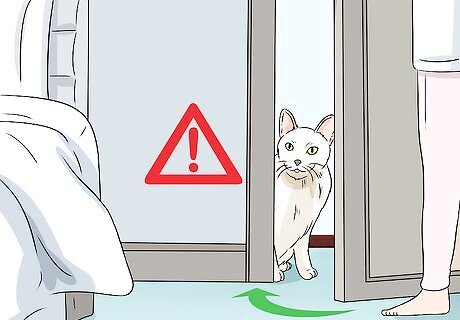
Keep your cat out of your bedroom. You likely spend at least a third of your day in your bedroom sleeping. By keeping your cat out of your room, you will greatly reduce your overall exposure to cat allergens. Keep the door to your bedroom shut when you are gone, and ensure that your cat’s toys and food are located elsewhere in the house.
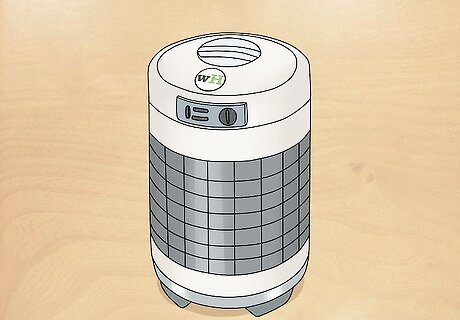
Consider a HEPA filter. HEPA filters are high-powered air-particle filters that can remove microscopic pet dander from the air. Place HEPA filters in the rooms you spend the most time in at home, such as your bedroom or home office, to reduce your exposure to allergens. Most HEPA filters are rated to clean a certain number of cubic feet (or meters). Aim to buy a HEPA filter the filtering capacity of which matches the size of your room.

Change out the filters in your HVAC system. If you have central heat and air, you can use your HVAC system to filter the air throughout your house. Purchase air filters that have a high minimum efficiency reporting value (MERV) rating. These filters will capture pet dander as well as other allergens such as pollen, molds, and dust mites. Look for filters with a MERV rating of 13 or higher to capture more pollen. Choose disposable filters and replace them every 3 months.
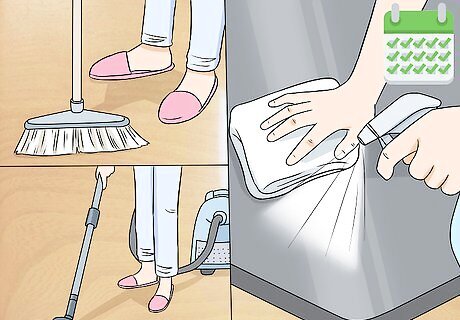
Clean the house regularly. Cat hair, which is covered in allergenic saliva, and cat dander are shed in your house constantly. To keep your allergies under control, clean your house at least once a week to reduce the number of allergens in the environment. If possible, it is preferable to hire someone without allergies to clean your house, as sweeping and vacuuming can dust allergens up into the air and aggravate allergy symptoms. If you allow your cat in your bed, wash your sheets in hot water twice a week. Certain vacuums, such as the Eureka Sanitaire True HEPA and the Sunpentown V8506 with HEPA, have HEPA filters, which can remove even more allergenic particles from the air. It may be worth investing in one if your allergies are severe.
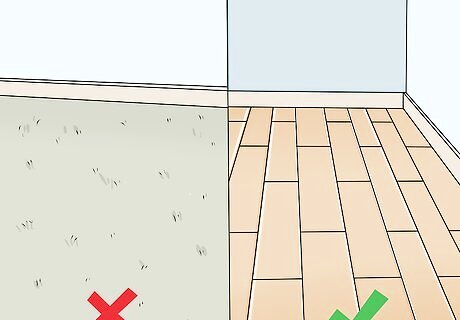
Switch out carpets and drapes for allergy-friendly home furnishings. Cat dander is microscopic and can be difficult to draw out of rugs, drapes and upholstered surfaces even with regular cleaning. Wood, stone, and metal furnishings are all easier to clean fully than fabric surfaces. By swapping rugs for hardwoods or tile, and choosing non-upholstered chairs, you can reduce the amount of pet dander in your home.
Keeping Your Allergies Under Control
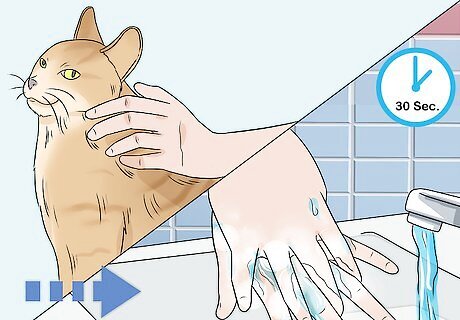
Wash your hands after touching your cat. Your cat licks itself clean, which means its hair is covered in allergenic saliva. After touching your cat, be sure to wash your hands with soap and warm water, scrubbing for at least 30 seconds. This is especially important before you touch your face, which is particularly sensitive to allergens.
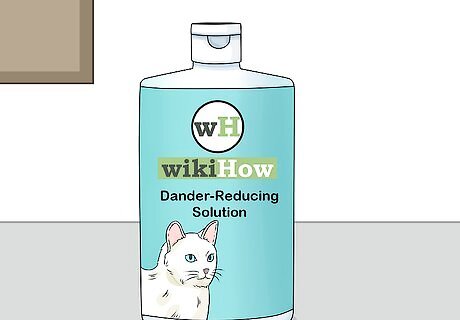
Use a dander-reducing solution on your cat weekly. Certain dander-reducing solutions and shampoos, such as Allerpet and Nature’s Miracle Allergen Blocker, cleanse your cat and can remove some allergy-causing dander. Wet a small washcloth with the cleaner and wipe your cat’s face and body, going with the direction of the fur rather than against it. While there is no definitive proof that these truly reduce the allergens coming from your pet, it may be worth trying if your allergies are more mild.

Take OTC allergy medication regularly. Taking an allergy medication, such as Benadryl or Claritin, can reduce allergy symptoms. One to two pills of Benadryl can be taken every 4-6 hours, and one pill of Claritin can be taken once daily. These medications block your body’s histamine reaction, which is what makes your eyes water and skin itchy in response to cat dander. If your allergies are severe, it may make sense to have a consultation with an allergist to see if prescription allergy medication is right for you.

Consider allergy shots. If you have your heart set on having a cat despite your allergies, allergy shots can actually reduce how allergic you are to cats. These shots are made from a serum of cat allergens and injected into the upper arm at incrementally increasing doses over a number of weeks until you reach a maintenance dose, which you can receive monthly. The shots increase your tolerance for cat allergens, effectively reducing your symptoms. You will need to be tested for your allergy by an allergist, who will mix an injection serum specifically for you. It often takes up to 6 months of regular injections for allergy shots to take effect. They also work better for some people than for others. Make an appointment with an allergist to discuss your options and if allergy shots are right for you.




















Comments
0 comment